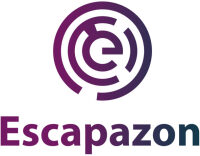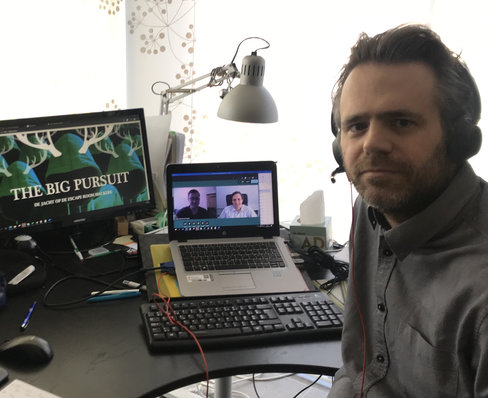Escapazon
 On 10th April 2020, BEFEB delivered the closing keynote at Escapazon: the first Online European Escape Room Conference.
The topic of the talk was "Crisis or no crisis: the necessity for escape rooms to work closely together", a topic BEFEB is certainly fit to present.
On 10th April 2020, BEFEB delivered the closing keynote at Escapazon: the first Online European Escape Room Conference.
The topic of the talk was "Crisis or no crisis: the necessity for escape rooms to work closely together", a topic BEFEB is certainly fit to present.
This blog post summarizes the talk we gave to about 60 escape room owners spread over many countries in three continents.
The escape room sector
Young
Escape rooms form a relatively young sector. Sure, there have been many escape room-like entertainment options around, and arguably the first 'modern' escape room opened in Japan over 15 years ago now. Still, what we understand globally as an escape room these days is a very new concept.
Moreover, many escape rooms are also relatively new business overall, mostly even ran by fresh entrepreneurs on their first business venture.
Competition?
A typical escape room business is also unusual in that we can only have each customer play each room once. That means a lot of churn in our customer base and a need for relentless marketing to get new customers to come and play.
Secondly, it is known that if a person has two positive escape room experiences within a time span of six weeks, that person is very likely to become a repeat player. We all benefit more the larger the (small) group of enthusiasts becomes.
 These simple observations have lead many escape room businesses worldwide to enter into an understanding that other escape room owners can play their rooms for free.
At escape rooms, more often than not you get presented with flyers for other escape rooms in the neighbourhood.
You don't see this phenomenon at cinemas, hotels, bars or restaurants, do you?
These simple observations have lead many escape room businesses worldwide to enter into an understanding that other escape room owners can play their rooms for free.
At escape rooms, more often than not you get presented with flyers for other escape rooms in the neighbourhood.
You don't see this phenomenon at cinemas, hotels, bars or restaurants, do you?
Creativity and originality
We are in the business of creative entertainment. Escape rooms need to constantly innovate and ensure unique experiences to their players. It is, therefore, crucial to maintain this creativity and to stay original.
Writers read more books than most people. Moviemakers watch more movies than most people. Escape room designers should play more escape rooms than most people. To deliver quality and originality, you need to be an expert in your field, not only through books and websites but also through personal experience.
Benefits of collaboration
For the individual escape room
The benefits of collaboration for participating escape rooms are pretty obvious. First, business owners will simply learn more about running a successful business. Running an escape room also involves managing personnel, rent, taxes, fire regulations, online and offline marketing and much more. Entrepreneurs learn a lot from shared experiences, problems and solutions.
Then there is also a heightened sense of perspective. By seeing first hand what other escape rooms are doing, it becomes easier to envision your own future. Also, as collaboration sometimes brings friction with it as well, knowing that you cannot simply abandon your obligations forces you into thinking more towards long term compromises, again increasing your horizon.
For the escape room sector
 Yet, perhaps the most important point to make surrounds the benefits of collaboration for the entire sector — and therefore indirectly for individual actors in it of course.
This concerns gigantism, or the idea that companies always need to get larger in order to thrive, or even survive.
Larger entities of course benefit from so-called economies of scale: less personnel overhead, lower taxes, shared cost centres, etc...
However, this also leads to unfair disadvantages against new innovators.
In many sectors, the highest ambition a start-up can have is only to see itself being acquired by a larger, established entity.
Yet, perhaps the most important point to make surrounds the benefits of collaboration for the entire sector — and therefore indirectly for individual actors in it of course.
This concerns gigantism, or the idea that companies always need to get larger in order to thrive, or even survive.
Larger entities of course benefit from so-called economies of scale: less personnel overhead, lower taxes, shared cost centres, etc...
However, this also leads to unfair disadvantages against new innovators.
In many sectors, the highest ambition a start-up can have is only to see itself being acquired by a larger, established entity.
Then there are disadvantages of scale to be considered as well as the following example clearly shows. Small companies speak about "their people". Later, this becomes "staff", after which we get "human resources". Finally, the awful concept of "human capital" inevitably pops up.
A similar fate is bestowed upon innovation and creativity when embedded in big structures. Larger entities are simply less agile. They survive because of sheer size, not because of an ability to change and adapt. It goes without saying that, in our sector, this would result in lower quality escape room experiences for the customer.
Imagine now a future with a handful of large players on the market, each with 1000+ rooms in 25 countries. Or imagine for a second any existing entertainment mastodont sets its eyes on the escape room market.
If countries or regions want to resist that, the old adagio sounds true as ever: united we stand, divided we fall.
BEFEB
The talk ended by providing ample examples of how BEFEB is performing in its crucial role in Belgium, sometimes very effectively, sometimes with the inescapable stumbling of a new organisation. Instead of listing them again here, let us end by making a bold statement: Only if in a few years time the Belgian escape room sector still maintains and cherishes its current bustling innovativeness, its startup-atmosphere and its eagerness to grow, improve and collaborate, BEFEB will have succeeded.





